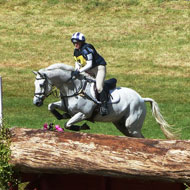French team disqualified from the Olympics

Following the French team's disqualification, Canada now qualifies for Rio 2016 (generic image)
A French eventing team has lost its spot in the 2016 Olympic Games in Rio after one of its horses tested positive for a controlled medication substance.
Samples taken from the horse, Qalao des Mers, in August last year found Hydroxyethylpromazine sulfoxide. The substance is a metabolite of the sedative, Acepromazine, which is on the FEI prohibited substances list.
Controlled medications are defined as those that are commonly used to treat horses, but are prohibited in competitions to maintain fairness.
The horse and its rider, Maxime Livio, were disqualified along with their team from the eventing competition at the FEI World Equestrian Games 2014.
The FEI Tribunal will make a final decision on further sanctions at a later date.
Livio came fifth in the individual rankings and the team finished fourth in Normandy, securing their slot in the Olympic Games.
Following the French team's disqualification, the Canadian eventing team has moved up to sixth place and qualifies for Rio 2016. Other nations so far competing in next year's games are Great Britain, Ireland, Germany, Australia, the Netherlands and Brazil as the host country.
Another case against Livio was dropped earlier this month. A borrowed horse ridden by Livio at a jumping event in Thailand last November initially tested positive but a second sample failed to confirm this.



 The RCVS has announced a new version of its 1CPD mobile app, with enhanced features for veterinary surgeons and veterinary nurses to record their continuing professional development.
The RCVS has announced a new version of its 1CPD mobile app, with enhanced features for veterinary surgeons and veterinary nurses to record their continuing professional development.